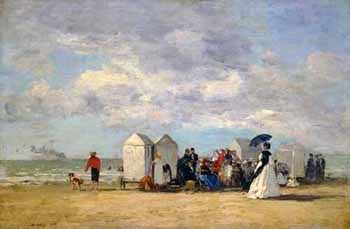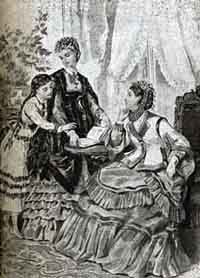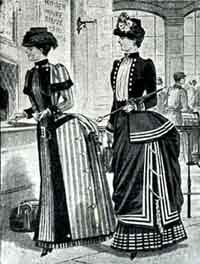I would like to address one of the most essential principles guiding the sad route being followed by the West, which is abandoning its Catholic cultural and social traditions and heading toward total Paganism.
What I would call the principle of “gradualism” refers to the fact that, when analyzing the long and victorious march of corruption in Christendom, one sees that it did not proceed by leaps and bounds. To the contrary, it progressed through stages so imperceptible that on that long trajectory everyone unconsciously slid into new ideas, customs and styles. Docilely sliding, mankind traveled an immense distance…

Sea bathing became a fashion in France in 1822, initiated by the daughter-in-law of King Charles X, Marie Caroline, Duchess of Berry |
The majority of the lamentable customs of the 20th century appeared timidly in the 19th century. We plan to publish a description - accompanied by illustrations - of the first attire for sea bathing that came into fashion among the high French society even before the 1830 revolution. A comparison could be made with modern beachwear – except we could not publish pictures of the latter since it has already “evolved” so much that it would stain the pages of a Catholic journal.
The discreet and noble ladies who initiated the custom of bathing on the French beaches would have been very surprised to see the beach clothes of the elegant society of 1920. And perhaps, in order to avoid such excesses, they would have even given up that custom still in its initial stage.
In turn, what would the elegant bathers in 1920 say if they could see how their daughters and nieces would be dressing at the beaches in 1956? This preview probably would have raised a salutary reaction in them. But, since no one foresaw such excess, the style continued along its course. Today [1956], we can ask: How will things be in 1986?
Any denunciation of this process that aims to raise a reaction has to take into consideration the principle of gradualism. Nothing seems more important than to understand how it works.
The gradual masculinization of women

Picture 1: An 1850 home ambience

Picture 2: A life turned toward outings

Picture 3: Moving toward a total masculinization |
Today I will deal more specifically with the masculinization of women, a phenomenon as absolutely deplorable and ridiculous as the feminization of men.
The first picture at right shows two young ladies and a girl in a comfortable room in the 1850s. The ambience in which they move is characterized by a note of gravity.
The curtains are thick; the chair is grand and noble; the vase has strong, defined lines and gold designs; a beautiful carpet covers the whole floor. At the same time the colors – which unfortunately our picture does not reproduce – are cheerful. The curtains are of a very light blue, almost aquamarine.
The seated lady, who seems to be a visitor, wears a beautiful dress of spring green and a white jacket. In her hair are some roses. The standing lady wears a brilliant lilac silk dress. The girl’s dress is white with red trim and ornamented with red ribbons. The same color is repeated in the ribbons in her hair and braids.
This mixture of gravity and charm characterize well the ambience of family life in those times past. In it, the woman could fully expand the precious qualities typical of her sex – sweetness, affability, charm, goodness and distinction.
The features of the three persons in our pictures are relaxed, calm and brimming with affection, indicating a relationship deeply marked by the best of feminine suavity and delicacy. They seem to find themselves in their proper element for the natural and instinctive practice of the Christian duties of spouse, mother and daughter.
Just a short time later, the masculinization began - although timidly. In the two young women in the second picture, one sees the beginning of an audacity, hardness and forwardness that contrasts with the first picture. One has the impression that, regarding home life, something very profound – although still very discreet – has taken place inside these ladies.
To these women the home seems somewhat insipid. They exhibit a manifest pleasure to be out in the streets, to face unexpected things, to have adventures, in short, to lead a life that already is not entirely turned toward the pleasures of the family.
The tenor has changed, and their more agreeable moments are those passed in promenading anonymously among the crowds. The more masculine hats and dress styles and, above all, the expression of the ladies denote this well.
In the third picture, we find a modern youth in a modern ambience (1956). If her hair were short, it would not be easy at first sight to tell if she would be a man or a woman.
Through all her pores she breathes the taste for adventure, for the battles of a life similar to that of a man, which demands the development of typically masculine qualities. A little more, and the masculinization will be as complete as possible.
But, someone might ask, what is wrong with this?
It is easy to respond. Here we find an evil similar to that which would manifest itself if today’s men would dress and live like the ladies in our first picture.
Purely and simply, it is a monstrous subversion of the natural order.
Published in Catolicismo, August 1956.
Translated by TIA desk.
Posted February 12, 2010

|